Thailand lese-majeste: UN urges amendment to law
- Published
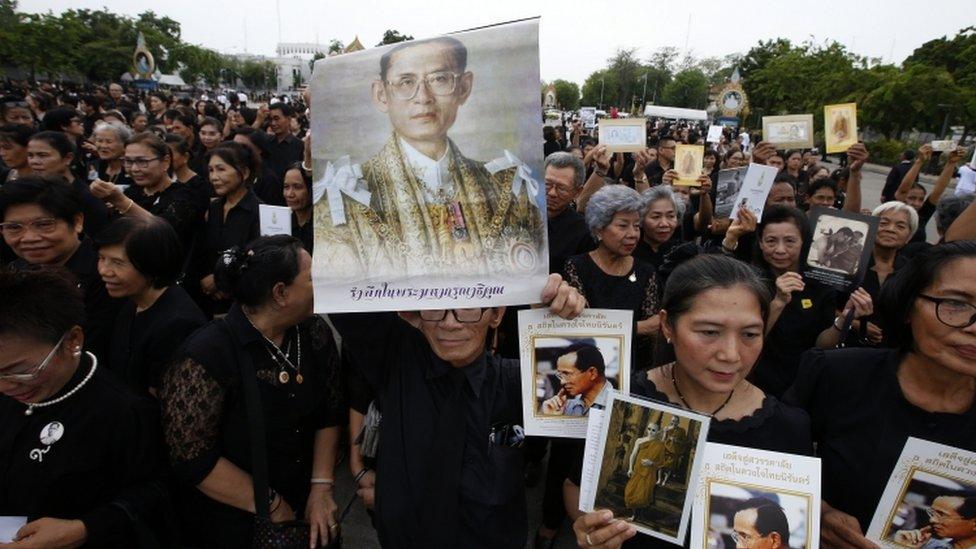
Thais mourn King Bhumibol, who died last year and is hugely revered
The United Nations has called on Thailand to amend its harsh law against insulting the monarchy. The Office of the UN High Commissioner for Human Rights said it was deeply troubled by the high rate of prosecutions, and the disproportionate sentences for the offence.
The UN said that since the military coup in 2014 the number of people investigated for violating the lese-majeste laws has risen to more than double the number investigated in the previous 12 years, and that only 4% of those charged were acquitted.
Trials are routinely held in closed session, often in military courts where defendants' rights are limited. Earlier this month a man was given a 35-year sentence for Facebook posts judged to have defamed the monarchy, the harshest penalty to date.
Two years ago, a similarly harsh sentence was given to a woman in the northern city of Chiang Mai.
On 7 August 2015, two military courts in Thailand handed down what were then the harshest sentences ever imposed under lese-majeste.
In the first, a court in Bangkok sentenced a 48-year-old tour guide operator, Pongsak Sriboonpheng, to 60 years in prison, 10 years for each of the Facebook posts critical of the monarchy that he was charged with writing. Because he pleaded guilty the sentence was halved to 30 years.
Pongsak acknowledged that he had become politicised during the prolonged political conflict which preceded the 2014 coup, and had often posted his views on Facebook.
But the second case, in Chiang Mai, was baffling. A 29-year-old single mother, with no history of political involvement, was sentenced by a military court to 56 years in jail, also for posting anti-monarchy content on Facebook. Her sentence, too, was halved after she agreed to plead guilty.
She had begged for leniency, given the ages of her two young daughters, and her mother's poor health. The tribunal was unmoved. Her name is Sasiwimon, and her story illustrates the sweeping scope of the lese majeste laws, deployed by a military government which has made defending the monarchy's exalted status in Thailand its highest priority.
Sasiwimon was jailed in 2015 for insulting Thailand's monarchy
Facebook revenge gone wrong
The regime at the Chiang Mai Women's Prison is relaxed enough to allow frequent family visits. But Sasiwimon's mother, Suchin, can rarely break away from her job as a cleaner in a hotel, and the two girls are in school most days. At best they can go every week or two.
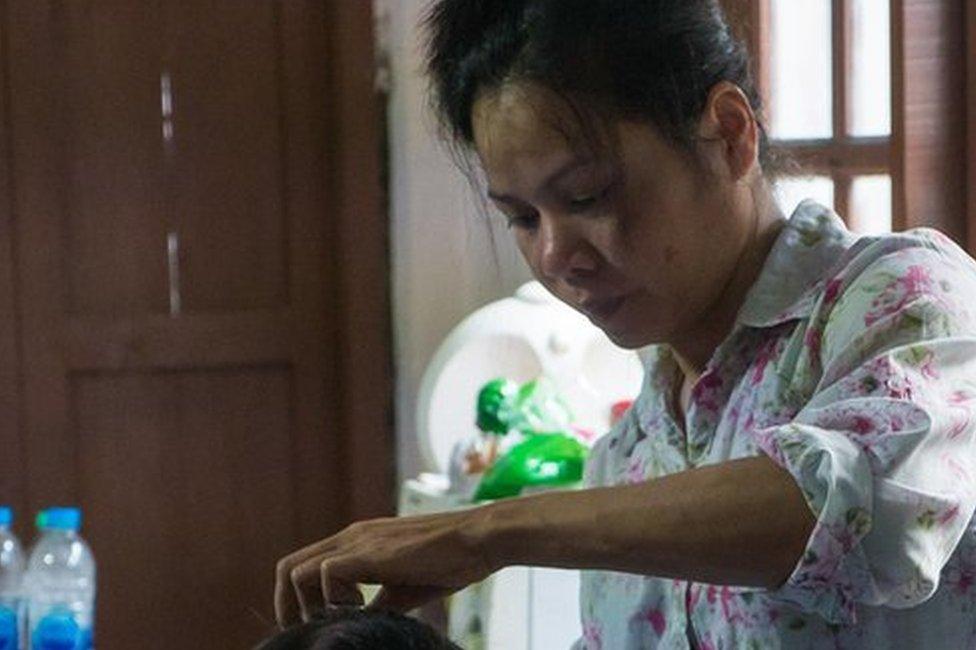
While Sasiwimon is in prison, her mother takes care of her two daughters
It takes up to two hours to get inside the prison, through the paperwork and security searches. Sasiwimon was brought out to meet us, in her loose blue prison dress, holding her arms out to the girls. For the hour we were allowed to stay, she did not let go of them.
She had been married to a mechanic, she explained, but he had left her for another woman. A friend she had made during a previous job in a restaurant had suggested to Sasiwimon a way to get back at the woman, by using a fake Facebook account.
She says the friend came back to her home, and used her computer to set up the account. Sasiwimon only found out what kind of comments the she was leaving on the fake Facebook page when she was sent screenshots of them a few days later. That friend has since disappeared, she says.
Ultra-royalist activist
At around the same time Krit Yeammaethakorn, who leads a group of ultra-royalists in Chiang Mai that monitors social media for anti-monarchy content, spotted the offending Facebook page.
"I was angry," he recalls. "This was not about politics. It was a natural reaction. We discussed what we had seen among ourselves, and decided that we had to act."
Mr Krit has strong feelings about the monarchy. He sobbed openly when he remembered hearing of the death of King Bhumibol last year. "I know we are the only country in the world that still treats kings like gods, like demigods. Yet our late king was not just a god - he was a living deity.
"That's how Thais feel toward him. I believe that in 5,000 years of world history, there has been no other king who was as great as he was."
On 27 September 2014, Mr Krit's group informed the Chiang Mai police, whose investigations eventually traced the Facebook page to Sasiwimon's computer.
Sasiwimon remembers the police coming to the house early in the morning a few days later. They confiscated her computer and two mobile phones. She accompanied them to the station, with her youngest daughter, who was running a high temperature.
The police showed her some of the comments from the Facebook page, and asked her to sign a document acknowledging that she had seen them. She says she did not understand that she was in fact signing a confession. She and her mother say they knew nothing about the lese majeste laws.
Sasiwimon says she had an alibi for the times the posts were published on Facebook; that she had been at work, in the hotel where her mother is also employed, and that she had no internet access there.
Martial law, no appeal
Four months later, Sasiwimon was asked to come back to the police station. She has been in custody ever since.
"I thought she was going to show up and then leave," Suchin told me. "I had no idea it was going to be this severe. I thought it might be a one-year sentence, maybe suspended. We never sold drugs. We never killed anyone, or stole anything.
"We learned about this law when it was too late. I didn't even have time to come to terms with the fact that my child would be gone."

The authorities are also sensitive of content about the new King Vajiralongkorn
Typically for a lese majeste case, she was refused bail. When her trial date finally arrived after five months, on 7 August 2015, her lawyer advised her that she had little chance of acquittal, and should change her plea to guilty to reduce the sentence.
The charges were read out in a closed session, because the alleged offences were deemed too sensitive for the public to hear. And because she pleaded guilty the evidence against her was never tested.
"When the verdict was read, my ears were ringing," recalls Suchin. "They said this offence insulted the high institution, so it carried a high penalty. I didn't know how high. I thought ultimately it might be four to five years, but I never thought for a second it would go that high. More than 20 years… I didn't even think about 10 years."
In a military court, under martial law, there was no right of appeal.
In their small rented house in Chiang Mai, the tatty calendar on the wall has been left with the front page at August 2015, the 7th ringed, and also the 28th. I asked Suchin why. She said that while her eldest granddaughter had understood the sentence, the youngest, who was then seven years old, had thought it meant her mother would be coming out on 28th August.
There are also faded pictures of the royal family on the walls. "No-one in this family has ever insulted or defamed the monarchy. Never," she said.
Hopes for a pardon
When he informed the police about the Facebook posts, Mr Krit had not known who was responsible for them. Would he do the same again, knowing that a young mother of two girls would get such a long sentence?
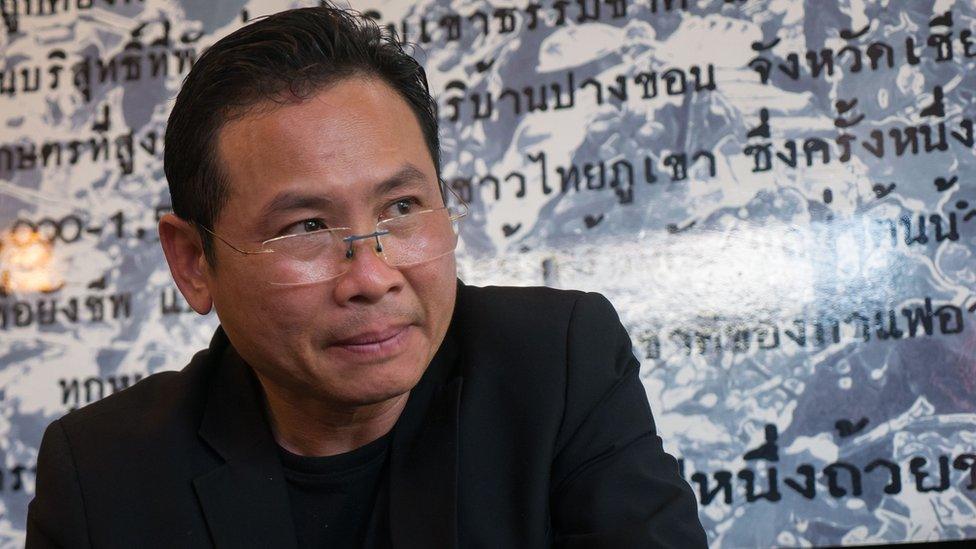
Krit Yeammaethakorn does not regret his actions but says he does hope for a pardon for the young mother
"I don't regret it and no-one else does. This is an issue affecting the highest institution, for which Thais have the utmost respect," he told me.
"It's like when a judge hands down a sentence but he still manages to remain unattached emotionally.
"Although the culprit was young, she didn't understand the law, and has two young children, the right thing is… even if we had not filed a complaint, the law had to deal with her. The offender had to be punished."
Mr Krit has not inquired about Sasiwimon's situation now, but hopes she will get a pardon. And perhaps there is some official acknowledgement that the sentence against her was too harsh, as she has already had her sentence reduced, in two royal pardons, to 12 years. This still means her daughters will have grown up by the time she leaves prison.
But she remains hopeful of further pardons, although embarrassed, she says, that she has to ask for mercy from the very institution she is accused of insulting.
- Published16 May 2017

- Published7 December 2016
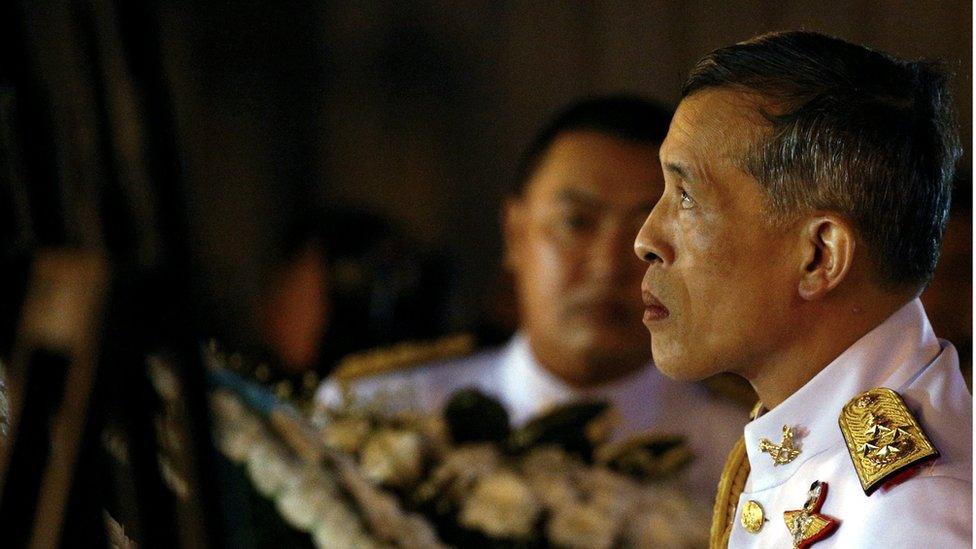
- Published6 October 2017
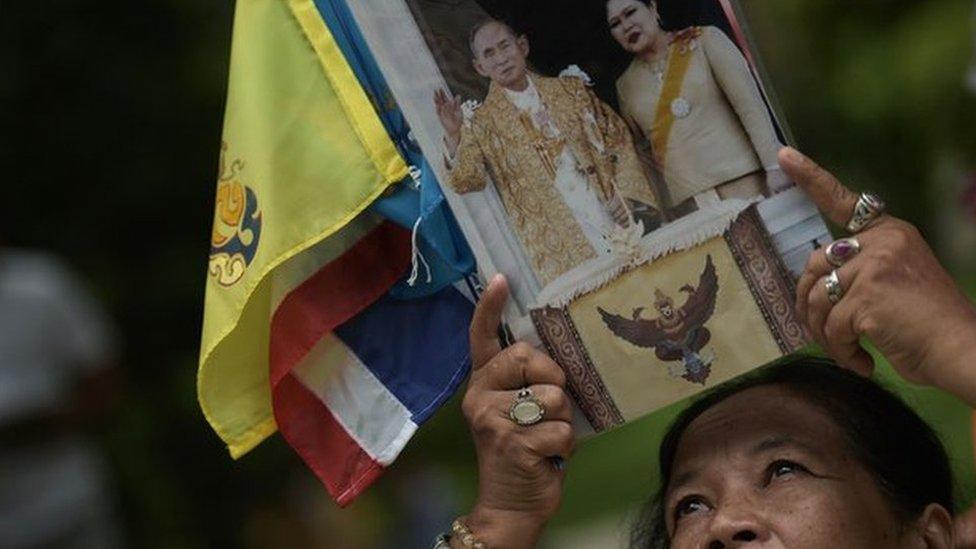
- Published16 December 2015
